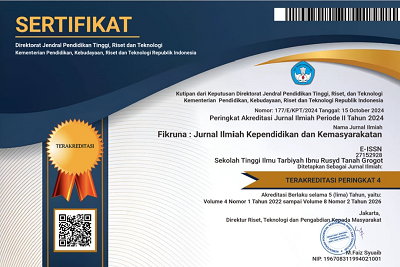THE INFLUENCE OF AL-KASBU ON SA�ADATUL UMMAL IN ISLAMIC BANKS IN EAST KALIMANTAN PROVINCE
Abstract
The purpose of this study is to analyze the influence of al-kasbu on sa'adatul ummal in Islamic banks in East Kalimantan Province. This study uses a quantitative and qualitative approach, which is useful for descriptively explaining the existence and role of a research object or research variable on other research variables, by statistically analyzing the causal relationship between research variables. The results reveal that Al-Kasbu has a significant positive effect on Sa'adatul Ummal. The higher the al-Kasbu, the higher the sa'adatul ummal. The ability to manage wealth/assets and the strong next generation of families from Islamic banks in East Kalimantan Province over the last 5 years, from 2008 to 2012, has also increased annually. Al-Kasbu has been carried out properly and correctly by employees at Islamic banks in East Kalimantan Province in accordance with the meaning contained in al-Qur'an surah (9) at-Taubah verse 105, although it is not yet kaffah because the quality of work is still not optimal, as indicated by the lowest average perception score of respondents. Al-Kasbu, which is employee performance with indicators: achievement, speed/accuracy, service, quality of work, increasing the amount of Zakat Infaq Shadaqah (ZIS), increasing sunnah worship, discipline, and efficiency, has a significant positive effect on Sa'adatul Ummal. This means that the higher the al-Kasbu, the more Sa'adatul Ummal will increase through indicators of maintaining religion, soul, intellect, wealth, and offspring. This ultimately increases the overall Sa'adatul Ummal for Islamic bank employees in East Kalimantan Province.
References
Abdullah, N., & Ahmad, S. (2024). The Impact of Islamic Ethical Practices on Employee Loyalty in Islamic Banks. International Journal of Islamic Finance, 6(2), 112-128.
Ahmed, S. (2019). Employee Well-being in Islamic Organizations: A Critical Review. Journal of Islamic Management Studies, 3(1), 1-15.
Akram, M. U., Riaz, A., & Khan, M. A. (2020). The Impact of Islamic Work Ethic on Customer Trust and Loyalty: Evidence from Islamic Banks. Journal of Islamic Banking and Finance, 7(4), 1-18.
Ali, A., Zaman, R., & Khan, M. (2022). Islamic Work Ethic and Employee Performance: The Mediating Role of Training and Development. International Journal of Islamic Economics and Finance, 5(2), 1-18.
Al-Mahmood, A. (2019). Islamic Work Ethic and Employee Satisfaction: Evidence from Malaysian Islamic Banks. Journal of Islamic Accounting and Business Research, 10(4), 589-604.
Ascarya. (2019). Akad & Produk Bank Syariah. Rajawali Pers.
Bakar, A. H., & Yahya, A. (2022). The Role of Islamic Financial Literacy in Enhancing Employee Performance in Islamic Banks. Journal of Islamic Accounting and Finance, 9(1), 45-60.
Bank Indonesia. (2023). Laporan Perekonomian Indonesia.
BPS Kalimantan Timur. (2023). Produk Domestik Regional Bruto (PDRB) Kalimantan Timur.
Chapra, M. U. (2000). The Future of Economics: An Islamic Perspective. The Islamic Foundation.
Farooq, O., & Siddiqui, D. A. (2020). Islamic Work Ethic and Organizational Citizenship Behavior: The Mediating Role of Organizational Justice. Journal of Business Ethics, 164(4), 769-784.
Fatmawati, F. (2024). The Impact of Fair Remuneration System on Employee Motivation in Islamic Banks. Journal of Islamic Banking and Finance, 11(1), 1-15.
Fauzi, A., & Ismail, I. (2021). Competition and Performance of Islamic Banks in Indonesia. Journal of Islamic Economics, Finance, and Banking, 3(2), 1-14.
Ghani, E. K., & Rahman, A. (2021). The Influence of Transformational Leadership on Employee Well-being in Islamic Banks. Journal of Islamic Management Studies, 5(1), 1-17.
Harahap, S. E., & Siregar, E. (2023). The Effect of Sharia Compliance on Employee Engagement in Islamic Banks. Journal of Islamic Economics, 4(2), 1-15.
Hasan, M. (2017). Leadership and Performance of Islamic Banks: The Mediating Role of Organizational Culture. Journal of Islamic Management Studies, 1(2), 1-16.
Hassan, M. K., & Abdullah, M. (2023). The Role of Ethical Leadership in Promoting Islamic Work Ethic in Islamic Banks. Journal of Islamic Business and Management, 13(3), 45-60.
Hussain, F., & Khan, N. (2022). The Impact of Islamic Corporate Governance on Employee Performance in Islamic Banks. Journal of Islamic Finance, 11(3), 210-225.
Ibrahim, M. I., & Bakar, A. R. (2020). The Influence of Islamic Organizational Culture on Employee Engagement in Islamic Banks. Journal of Islamic Social Sciences and Humanities, 7(1), 1-18.
Iqbal, Z. (2018). Islamic Finance and Human Resource Management: A Review of Literature. Journal of Islamic Economics, 1(1), 1-12.
Karim, M. A. (2021). Al-Kasbu and Business Performance: Evidence from Islamic Financial Institutions. Journal of Islamic Finance, 10(2), 1-15.
Khan, A. (2010). Islamic Banking and Finance: Theory and Practice. Routledge.
Muhammad, A., & Abdullah, F. (2024). The Role of Islamic Work Ethic in Promoting Employee Creativity: Evidence from Islamic Banks. Journal of Islamic Business and Management, 14(1), 1-18.
Nasrullah, M., & Khan, M. Z. (2019). Islamic Work Ethic and Profitability: Evidence from Islamic Banks in Pakistan. International Journal of Islamic Economics and Finance, 2(1), 1-15.
Otoritas Jasa Keuangan. (2023). Laporan Perkembangan Industri Jasa Keuangan Syariah.
Otoritas Jasa Keuangan. (2024). Laporan Tahunan OJK Kalimantan Timur.Rahman, A. (2020). Human Resource Management in Islamic Banks: A Conceptual Framework. Journal of Islamic Economics and Finance, 6(1), 1-14.
Robbins, S. P., & Judge, T. A. (2017). Organizational Behavior. Pearson Education.
Saeed, M. (2018). Islamic Banking and Employee Well-being: A Literature Review. Journal of Islamic Finance, 7(1), 1-18.
Saleem, H., & Khan, M. A. (2017). Risk Management Practices in Islamic Banks: The Role of Islamic Work Ethic. Journal of Islamic Banking and Finance, 4(3), 1-15.
Sari, P. D., Wijaya, L., & Putra, I. K. (2023). Turnover Intention and Job Satisfaction: A Study on Islamic Banks in East Kalimantan. Journal of Islamic Business and Economics, 2(1), 1-10.
Suharto, S., & Wibowo, A. (2022). Human Capital Development in Islamic Banking: Challenges and Opportunities. Journal of Islamic Economics, Finance, and Accounting, 1(1), 1-10.
Yusof, R. M., & Hassan, M. A. (2019). The Relationship between Islamic Work Ethic and Job Satisfaction: A Meta-Analysis. Journal of Islamic Management Studies, 3(2), 1-20.
Zainal, H. B., Majid, I. A., & Ismail, S. (2021). The Impact of Islamic Work Ethic on Employee Motivation and Performance: Evidence from Islamic Financial Institutions. Journal of Islamic Management Studies, 5(2), 1-18.
Copyright (c) 2025 Maria Wati

This work is licensed under a Creative Commons Attribution-NonCommercial 4.0 International License.



.png)












